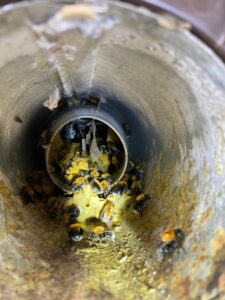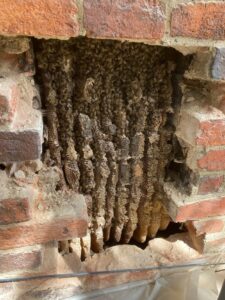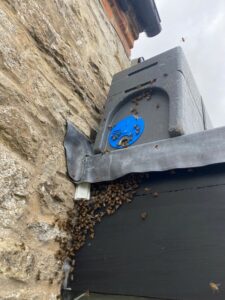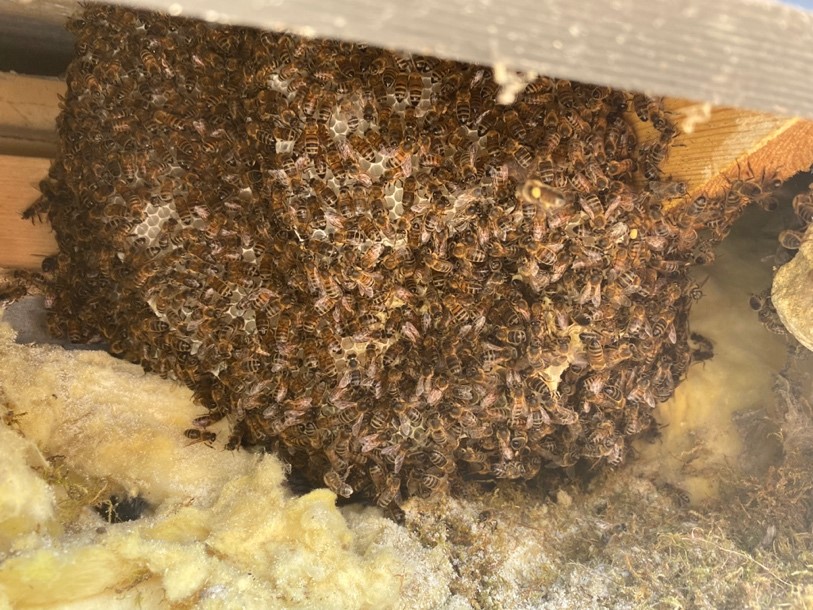How To Get Rid of Bees
Bees are extremely important insects as far as our ecosystems are concerned. Without them many of the crops that we rely on would not be pollinated potentially leading to food shortages, did you know that there are around 70 crops in the UK which depend on our Bee pollination? Despite their importance, having a bee colony in your garden or in your property is not something that is hugely popular and many people will understandably, want to get rid of them.
Bee prevention
 The advice we give in respect of bees depends on whether the bees are honeybees or bumble bees. Where possible, we advise people to live with bumble bees, as they are only around for a short time and they will die out naturally towards the end of the summer. However, the advice we give for honeybees in properties is different.
The advice we give in respect of bees depends on whether the bees are honeybees or bumble bees. Where possible, we advise people to live with bumble bees, as they are only around for a short time and they will die out naturally towards the end of the summer. However, the advice we give for honeybees in properties is different.
Ultimately there is no 100% fool proof way of preventing bee activity in your property, Bees only need a very small hole to gain access to a property, and these are often found, particularly at roof level. However, there are some ways to prevent bees from getting into your property though: ensure that all your vents have insect-proof mesh in them. This is essentially a fine metal mesh which allows your vents to work but keeps insects out. The same can be applied to redundant chimneys, which are a favourite spot for honeybees. Ensure that your mortar is in good condition and that any small holes in walls, doors or windows are sealed up. Where pipes are removed from walls, it is important to block up holes. We also recommend you make sure that food is covered up, especially outside. Bees are attracted to sugary foods but also dairy products and meats. By covering the food and putting it away as soon as possible, bees are less likely to be attracted. Finally, you could try using harmless, natural insect repelling plants like mint, citronella, eucalyptus and cloves, although these will not have any effect where a bee colony has already established itself.
How to spot a bee colony
 Bumblebees will start to nest early in Spring and will naturally disappear towards the end of summer, so you are only likely to spot any issues during this period.
Bumblebees will start to nest early in Spring and will naturally disappear towards the end of summer, so you are only likely to spot any issues during this period.
Honeybees naturally swarm between around April to June each year and will arrive at your property in a large swarm of around 15-30,000 bees. The swarm will settle in a cluster and will rapidly enter your property if they have decided there is a cavity of sufficient size to be their new home.
Either way, the most obvious sign of a bee colony being present at your property will be that there are more bees than normal flying around your home or garden than usual, and the bees will be accessing and egressing from one particular point.
What to do if I find I have bees living in my property?
Unless someone in your family is likely to have a bad reaction to a sting, and the bees are in a location that is problematic, where possible, we advise people to live with bumble bees, as they are only around for a short time and they will die out naturally towards the end of the summer. If they are outside, simply cordon off the area and let them get on with it. Bees rarely show aggressive behaviour unless provoked but can be much more active when the weather is warm, which can be alarming to some people. Bumblebees very rarely go back to the same nesting site, so it should be a onetime visit, so enjoy your visitors. If the bees are in your property, it is unlikely that they will cause damage, but we understand that not everyone is happy with the thought of having bees nearby.
However, the advice we give for honeybees in properties is different. Honeybees will remain at a property year on year, and draw out more comb each year, so we always recommend having a chat with a competent bee removal company like iX5 Pest Control who can advise on the pros and cons of your situation and will give bespoke advice. If removal is the best course of action, it is far easier to remove a newly established small colony than one that has been present for a number of years.
Help Removing Bees
 As we have our own bees, when we remove bees (both bumbles and honeybees), we always rehome them in our apiary, and in some cases, we gift honeybees to other responsible beekeepers.
As we have our own bees, when we remove bees (both bumbles and honeybees), we always rehome them in our apiary, and in some cases, we gift honeybees to other responsible beekeepers.
At iX5 Pest Control we are rapidly becoming the recognised local experts in bees, and offer specialist bespoke advice on all bee situations, throughout Northamptonshire and the surrounding areas. Why not give us a call on 01604 328545 or via email at [email protected] or via our website contact page if you believe you have a problem with bees.
Bees are not a protected species, so technically could be treated, although there are no professional use insecticides approved for use on bees any longer. Many bees are however endangered so we at iX5 Pest Control do not eradicate bees but work with people to find other solutions.

